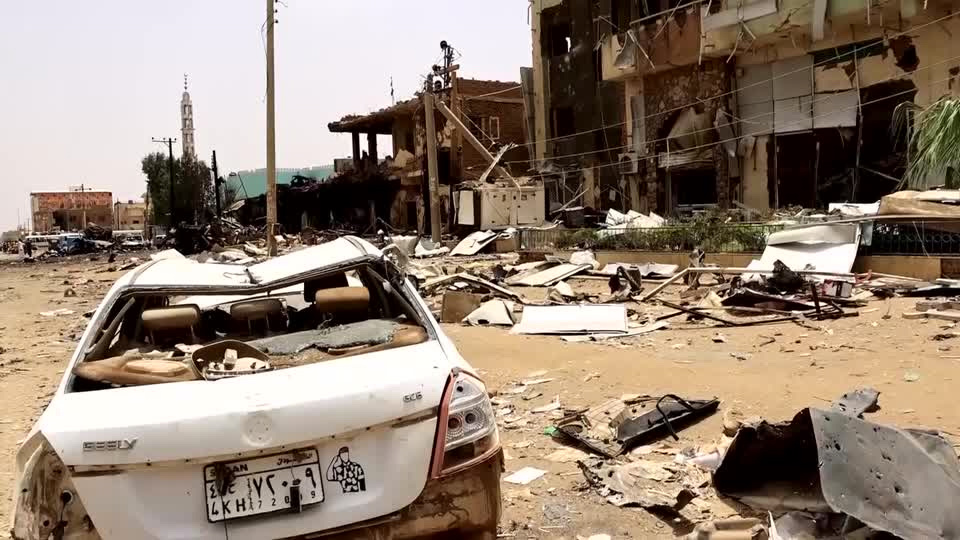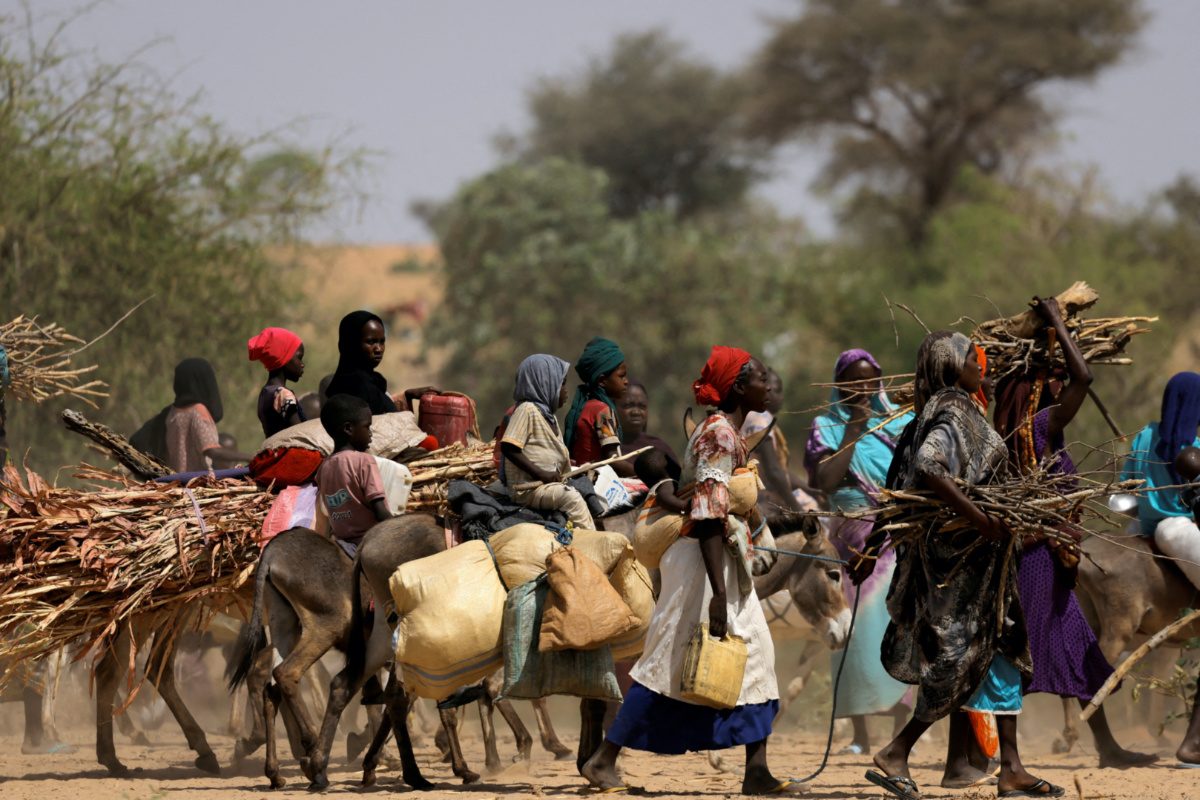Khartoum, Sudan
Reuters
Air strikes and artillery pounded Khartoum on Friday after Sudan’s warring army and Rapid Support Forces paramilitary failed to agree to a ceasefire despite committing to protect civilians and allow humanitarian access.
A so-called declaration of principles was signed in Saudi Arabia late on Thursday after nearly a week of talks between the two factions, which had shared power before falling out over a transition to civilian rule.

Damage caused by fighting in Sudan. PICTUREVideo screengrab/Reuters
RSF adviser Moussa Khadam told Sky News Arabia the group would abide by the principles agreed to and aimed to reach a complete ceasefire. But there was no let-up in violence and the army has not commented on the agreement.
Since clashing suddenly on 15th April, the rival military factions have shown little sign they are ready to end deadly fighting that has uprooted hundreds of thousands of people and could pitch Sudan into a full-blown civil war.
UN REFUGEE AGENCY: 200,000 HAVE FLED SUDAN
Some 200,000 people have fled from Sudan to neighbouring countries since violence erupted last month, a spokesperson for the UN refugee agency said on Friday, including many malnourished children arriving in Chad.

Sudanese refugees who fled the violence in Sudan’s Darfur region and newly arrived ride their donkeys looking for space to temporarily settle, near the border between Sudan and Chad in Goungour, Chad, on 8th May, 2023. PICTURE: Reuters/Zohra Bensemra/File photo
Some 60,000 have arrived through the desert to Chad, including about 30,000 in the past few days, UN refugee agency, UNHCR, spokesperson Olga Sarrado told a Geneva press briefing. Nearly 90 per cent of the new arrivals are women and children, she said, and one fifth of the young children are malnourished.
“UNHCR calls for immediate financial support for all actors involved in the response to avoid a humanitarian catastrophe, prevent tensions over strained resources and support those forcibly in a dignified manner,” she said.
“Support from the private sector has been slow compared to other emergencies, despite the urgency and severity of the crisis,” she added, saying a new appeal was expected after the agency called for $US445 million last week.
At the same briefing, a spokesperson from the UN children’s agency said that a factory in Sudan’s capital, Khartoum, producing food for malnourished children had burnt down.
“This is the darkest, most distinct illustration to date of how this conflict threatens the lives of children through multiple means,” said UNICEF spokeperson James Elder. He did not know whether the factory, which produces 60 per cent of the ready-made food cartons in Sudan, was deliberately torched.
– EMMA FARGE, Geneva, Switzerland/Reuters
The two forces issued competing statements on Friday that accused each other of harming civilians and ignoring the population’s humanitarian needs.
The conflict has paralysed Sudan’s economy and strangled its trade, aggravating a ballooning humanitarian crisis with the UN saying on Friday that 200,000 people have now fled into neighbouring states.
However, UN Sudan envoy Volker Perthes said he expected ceasefire talks to start again on Friday or Saturday and, while previous truces broke down because both sides thought they could win, neither now believes that victory would be quick.
His upbeat assessment contrasted with disappointment among many in the capital.
“We were expecting that the agreement would calm down the war, but we woke up to artillery fire and airstrikes,” said Mohamed Abdallah, 39, living in Khartoum. City residents said there was heavy fighting in parts of Khartoum and its adjoining sister city of Bahri.
In Darfur in the west, fighting between local militias that killed 450 people last month flared again in the city of Geneina as one group attacked another, rattling neighbourhoods with gunfire and artillery after two weeks of comparative calm.
In other parts of Darfur, where a war has simmered since 2003 killing 300,000 people and displacing 2.5 million, locally arranged ceasefires between the army and RSF appeared to hold.
In Port Sudan on the Red Sea, Al-Taj al-Tayyib said he hoped Thursday’s agreement represented a start towards peace. “Our country doesn’t need all these crises,” he said.
Humanitarian deal
Thursday’s deal, the product of Saudi and US-brokered talks in Jeddah, includes commitments to allow safe passage for civilians, medics and humanitarian relief, and to minimise harm to civilians and public facilities.
US officials said negotiations for a ceasefire would follow and Saudi Arabia called the agreement “a first step”. Mediators had pushed for the warring factions to reach a limited initial agreement as tension between them put a wider ceasefire out of reach for now, one told Reuters.
However, a senior US State Department official said the two sides “are quite far apart” and the official did not expect them to fully comply with the agreement.
The rival forces agreed to quit private homes and other property, but a family in Bahri said RSF fighters had tried to take over their house on Friday morning.
Khartoum residents have frequently accused the paramilitary of taking over houses and hospitals as part of a tactic to embed in districts throughout the city as it fights an army that can call on air power.
The RSF has denied the claim, accusing the army and other armed groups of invading property.
“The parties must convey clear and unequivocal instructions to lower ranks” to enforce Thursday’s agreement, said the United Nations, African Union and regional organisation IGAD.
However, Cameron Hudson of the Center for Strategic and International Studies said he doubted the RSF had enough control over its fighters to do so.
Previous ceasefire agreements have been repeatedly violated, leaving civilians to navigate a terrifying landscape of chaos and bombardment with failing power and water, little food and a collapsing health system.
Killed and displaced
Many UN and other agencies have suspended aid to Sudan and in particular Khartoum, awaiting guarantees that their supplies and staff will be safe.
The World Health Organization has said at least 600 people have been killed and more than 5,000 injured in the fighting, but that real numbers are likely much higher.
In Darfur, local activist Gouja said Thursday’s deal could help solidify locally arranged ceasefires.
“But if there’s no mechanism to monitor, then it won’t be an improvement,” he added.
Little humanitarian aid has reached Darfur’s main cities of Nyala and al-Fasher, Gouja said, with salaries unpaid for two months. In Geneina, infrastructure has been destroyed and the health system totally disabled, as tens of thousands of inhabitants have fled into nearby Chad.
More than 700,000 Sudanese have been internally displaced, according to the UN.






